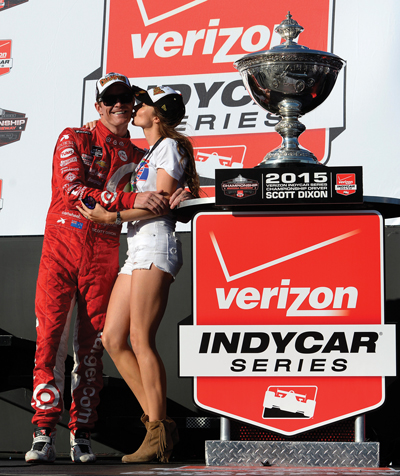IndyCar has new venues, big birthday
Since the end of last season, the Indianapolis-based open-wheel series saw a couple of team owners drop out of the sport, another feel compelled to merge his team with another operation, and yet another make public comments that the sport's ownership model needed to improve markedly.
 |
| Scott Dixon celebrates last year's IndyCar championship at Sonoma Raceway with wife Emma. Photo by: GETTY IMAGES |
But with a return to traditional open-wheel strongholds of Phoenix International Raceway and Road America, a new stop (for now) in Boston, a newly locked-in commitment from series manufacturer Honda and consecutive years of modest ratings growth, most industry executives agree that there are a sufficient number of things to build on.
"We've seen, not major leaps forward in the last few years, but some nice steps forward in terms of viewership, regional traffic, attendance," said Jon Flack, president and chief operating officer of Just Marketing International, Americas, which counts series title sponsor Verizon among its clients. "You've got a couple new venues on the schedule this year that are going to add some excitement, and then obviously the 100th running of the Indy 500 is an anchor right in the middle of your season. That should raise everything up."
Flack said that marketers of brands that his company has been pitching to join the sport have been enthused about the Indy 500's 100th running and that activation is shaping up to "be on another level" for that race. However, there are 15 other races on the 2016 schedule, which is five weeks longer than last year's, and rounding out inventory for the entire season has been difficult for some teams.
"It's not as rosy across the paddock as maybe it needs to be, but this is a different sport and I think everyone needs to pull up their boot straps and go out and sell," said Brian Marks, vice president of corporate sponsorships and marketing for Rahal Letterman Lanigan Racing, which brought on new sponsors Hyatt and Fifth Third Bank during the offseason.
"There aren't a lot of teams out there actively selling their partnerships; there are too many folks out there that are taking the easy road with the entitlement road and expecting the series to step up with more money, or they're just taking a guy with a paycheck or guy with a sponsor check willing to come in."
Team owners who made headlines during the offseason included Sarah Fisher and Willis Hartman, both of whom dropped their affiliation with the team now simply known as Ed Carpenter Racing due to financial strain; Bryan Herta, who merged his eponymous team with Andretti Autosport; and Sam Schmidt, who told digital news site Motorsport.com that it is "virtually impossible to justify a team owner's expenditure while we have just a U.S.-plus-Toronto-based calendar."
Jay Frye, who took over as IndyCar's president of competition and operations last year, said the series is reviewing measures to help improve the ownership model.
"There's many things we're reviewing and analyzing — some of them we've done this way for a long time, but that doesn't mean we need to do it that way going forward," Frye said.
"We've got to help them thrive in a different way, and there's many ways to do that. Whether it's revenue, cost-saving initiatives … if we can eliminate in-season rule changes — things like that — that obviously has a direct effect on their bottom line."
Another area to watch this year is the possible start of media-rights negotiations with ABC/ESPN and NBC Sports Network, as both of their respective deals expire after the end of the 2018 season. IndyCar CEO Mark Miles said he was in New York this month consulting with Bevilacqua Helfant Ventures on media rights. He added that informal talks with the networks may start this year, but formal talks likely won't start until at least next year. Adam Stern/SBJ